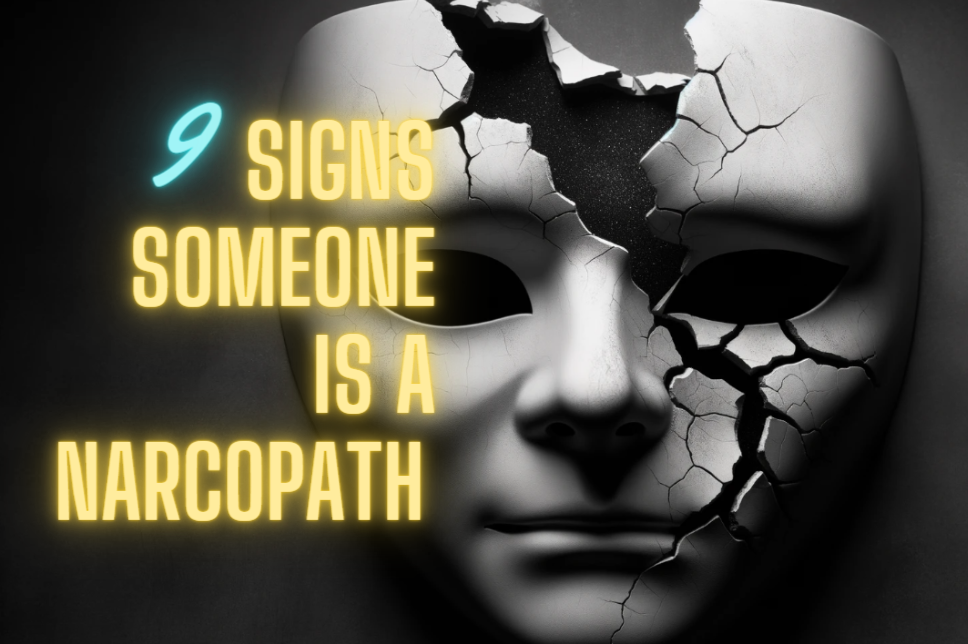Introduction
A narcopath is like a mash-up of a narcissist and a sociopath, bringing together some of the most concerning traits from both. It’s a combo that’s as intriguing as it is alarming. Picture someone with the self-centeredness of a narcissist and the lack of empathy from a sociopath. Yikes! Identifying a narcopath isn’t just about labeling or judging; it’s about understanding a serious personality disorder that can have profound impacts on those around them. Understanding these signs can be crucial for personal relationships, workplaces, and even safety. But hey, let’s dive into what these signs are and what they really mean. It’s complex, but we’ll break it down.
What a Narcopath Looks Like…
Lack of Empathy
When it comes to feelings, a narcopath is often missing in action. Think of a person who walks through a crowd and doesn’t even flinch when they step on someone’s toes – literally or figuratively.
That lack of empathy is more than just being a bit out of touch with others’ emotions; it’s a complete disconnect. They might see someone in distress, and it’s like they’re watching a movie with the volume turned off. No emotional response whatsoever. It’s not just being tough or cool; it’s a fundamental lack of understanding or even caring about what others are going through. This isn’t just some quirk; it’s a serious sign that something might be off. But remember, one sign doesn’t make a diagnosis, so let’s keep peeling back the layers.
Manipulation
Ah, manipulation. It’s like the favorite tool in the narcopath’s toolkit. While some folks might try to persuade or coax, a narcopath goes several steps further into manipulation territory. They don’t just want something from you; they want to play you like a fiddle. It could be as simple as getting their way in a decision or as complex as controlling an entire relationship.
The real kicker here is that they’re often really good at it. We’re talking expert level, making puppet masters look like amateurs. They use charm, deceit, and sometimes even intimidation to bend others to their will. But it’s not about collaboration or compromise; it’s all about what the narcopath wants. It’s manipulation on a grand scale, and it’s done without a second thought for how it affects others. It’s not just crafty; it’s downright chilling when you think about it. But like a mystery novel, the plot thickens, so let’s move on to the next sign.
Chronic Lying
Ever meet someone who lies so much they might as well have “Pinocchio” as a middle name? That’s a narcopath’s approach to truth-telling. They lie about big things, small things, and everything in between. It’s not just a white lie here and there to avoid hurting someone’s feelings; it’s a web of deceit that can be as baffling as it is extensive.
A narcopath doesn’t just bend the truth; they twist and reshape it to fit their narrative. Need to impress someone? Inflate accomplishments. Want to evade responsibility? Shift the blame. The truth is like clay in their hands, molded to suit their needs at any given moment.
And the really wild part? They often believe their lies or, at the very least, show no sign of discomfort when spinning their tales. It’s lying elevated to an art form, but with real-world consequences for those caught in the web. But hang tight; there’s more to uncover in this intriguing yet concerning personality profile.
Superficial Charm
Now here’s where things get a little tricky. Superficial charm is like the narcopath’s secret weapon. Imagine someone who can turn on the charisma like flipping a switch, all smiles, compliments, and engaging conversation. Sounds great, right? But here’s the catch: it’s all a show, a carefully crafted performance designed to lure people in.
A narcopath’s charm isn’t about genuine connection or warmth. It’s a means to an end, a way to get what they want, whether that’s admiration, compliance, or something else entirely. They’re like the consummate actor, always in character and ready to play the part that gets them what they desire.
It’s not that they’re always insincere; it’s that the sincerity comes with an ulterior motive. And what makes it so challenging is how convincing they can be. It’s like watching a movie and forgetting it’s all make-believe. But in real life, the stakes are much higher, and the performance isn’t confined to the big screen. The plot continues, and so do the signs, so let’s keep exploring.
Entitlement
Entitlement in a narcopath is like a king expecting everyone to bow, except there’s no crown, no kingdom, just an inflated sense of self-importance. They walk into a room, and it’s like they expect a red carpet to roll out. Special treatment isn’t just desired; it’s demanded.
The rules that apply to mere mortals? Nah, not for them. They’ll cut in line, demand the best of everything, and act like the world owes them, all without batting an eye. It’s not arrogance for arrogance’s sake; it’s a deep-seated belief that they’re simply better, more deserving.
But don’t mistake this for confidence or ambition. It’s a pervasive sense of superiority that permeates every interaction, every decision. It’s not just wanting the best seat at the table; it’s believing that seat has their name engraved on it, and woe betide anyone who thinks otherwise.
This sense of entitlement isn’t just off-putting; it’s a sign of something more significant at play. It’s like a neon sign flashing “Something’s Not Right Here.” And as you’ve probably guessed, there’s still more to discover, so the journey continues.
Impulsiveness
Next up on this rollercoaster ride of characteristics is impulsiveness. For a narcopath, life’s like a game, and waiting isn’t part of the strategy. Want something? Go get it. Now. Consequences? Those are for later, if they even register at all.
Impulsiveness in a narcopath isn’t just about spontaneity or living in the moment. It’s an impulsive streak that can lead to some downright reckless decisions. It’s not jumping into a pool on a hot day; it’s diving headfirst without checking the water’s depth.
They might blow money on a whim, jump from one relationship to another, or make significant life decisions without pausing to think things through. The common thread? It’s all about immediate gratification, with no regard for the fallout.
The real problem here isn’t just the rash decisions; it’s the lack of foresight, the inability to consider the big picture. For a narcopath, the here and now is everything, and tomorrow’s problems will be dealt with… well, tomorrow. It’s a pattern that’s as risky as it is telling, but the story’s not over, so let’s keep digging.
Lack of Guilt or Remorse
Now, here’s a trait that really sets narcopaths apart from the crowd: a complete and utter lack of guilt or remorse. Most people feel a little twinge of something when they do wrong, a pang of guilt, or a moment of regret. Not so with a narcopath.
Imagine committing a foul act and then sleeping like a baby, with no second thoughts or worries. It’s like they’re Teflon-coated when it comes to conscience. Did something hurtful? No problem. Betrayed a friend? No big deal. It’s not that they don’t understand right from wrong; it’s that they don’t care.
This isn’t just being tough-skinned or pragmatic; it’s a profound absence of something that makes us human. And it’s not hidden away; it’s out there in the open, like a missing puzzle piece that leaves a glaring gap.
This lack of guilt or remorse isn’t just a personality quirk; it’s a red flag, a flashing warning light. It’s a sign that says “Proceed with Caution” because there’s something more going on under the surface. And as intriguing as it may be, there’s still more to unravel, so let’s move on to the next piece of this complex personality.
Constant Need for Stimulation
Ever watch a cat pounce from one toy to the next, never satisfied, always looking for the next thrill? That’s a narcopath’s relationship with stimulation. They’re always on the hunt for the next exciting thing, the next adrenaline rush, the next shiny object that catches their eye.
But this isn’t just a zest for life or a love of adventure; it’s an insatiable need for excitement that borders on compulsive. Ordinary life? Boring. Routine tasks? Forget about it. A narcopath craves stimulation like a gourmet craves fine dining, and they’re not content with ordinary fare.
Whether it’s extreme sports, high-risk business ventures, or whirlwind romances, the narcopath is always chasing that next high. And like a chase, it never really ends, because satisfaction is fleeting, and there’s always something new on the horizon.
It’s a relentless pursuit that can leave destruction in its wake, affecting relationships, careers, and personal well-being. It’s not just living on the edge; it’s teetering on a precipice, and the fall can be steep. But hold on, there’s one more sign to explore, so let’s continue down this winding path.
Inability to Maintain Long-Term Relationships
And finally, we reach the last sign on this journey: the inability to maintain long-term relationships. For a narcopath, relationships are like a revolving door. People come in, people go out, but nobody really sticks around for the long haul.
It’s not just about being picky or independent; it’s a pattern of failure in forming and sustaining meaningful connections. Friends, family, partners – they all come and go in a narcopath’s life. It’s like building castles out of sand; they look impressive for a moment but quickly crumble.
Why? Because real relationships require empathy, trust, compromise, and a host of other qualities that a narcopath either lacks or dismisses. They might dazzle in the short term, but the facade eventually crumbles, and the reality becomes apparent.
It’s a sad but telling sign of what lies beneath the surface. Relationships aren’t just challenging for a narcopath; they’re almost an impossibility. It’s a solitary existence, but one of their own making.
So there you have it, the complex tapestry of the narcopath, intriguing, alarming, and a study in human extremes. It’s been a deep dive, but understanding these signs is more than an academic exercise; it’s a window into a world that’s as fascinating as it is foreboding. But like all journeys, this one has reached its end, and it’s time to step back and ponder what we’ve uncovered.
Conclusion
So here we are, at the end of the road, looking back at the complex and often bewildering landscape of the narcopath. From a lack of empathy to a relentless need for stimulation, these signs paint a picture that’s both fascinating and unsettling.
But it’s worth noting that these signs are not a checklist for diagnosis, nor are they proof of a disorder. They are indicators, pieces of a puzzle that may point in a particular direction. And while they offer insight, they are not a substitute for professional assessment.
Understanding a narcopath isn’t just about recognizing signs; it’s about peering into the human psyche and grappling with extremes that challenge our very notions of personality and behavior. It’s a subject that continues to intrigue, challenge, and sometimes even alarm.
But as with all things in life, understanding begins with awareness. And awareness is the first step towards compassion, wisdom, and perhaps even healing. It’s a journey worth taking, even when the path is steep and the way unclear. And with that, the exploration concludes, but the questions and curiosity linger on.





